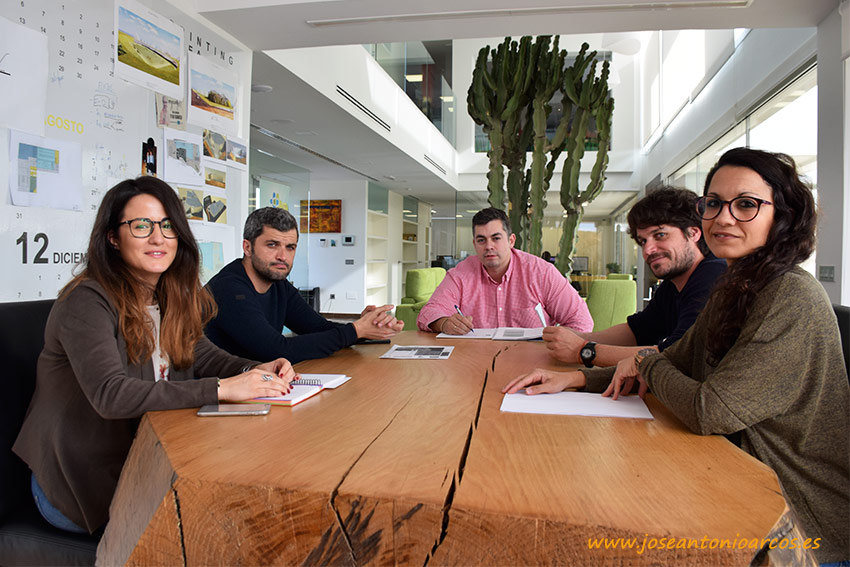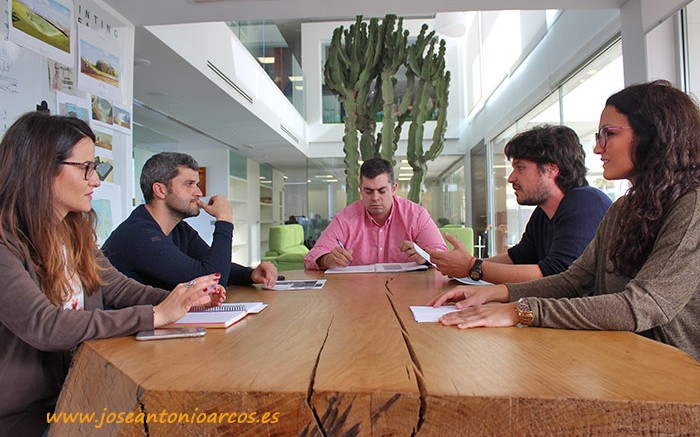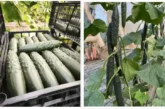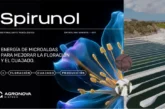La envergadura del proyecto no tiene precedentes en su sector. Una inversión de 38![]() millones de euros con la que Kimitec Group convertirá al Poniente almeriense en el Silicon Valley de la investigación agrícola en biopesticidas, biofertilizantes y probióticos. En apenas unos días se iniciarán los primeros movimientos de tierras en la cara norte de la autovía del Mediterráneo a su paso por Vícar.
millones de euros con la que Kimitec Group convertirá al Poniente almeriense en el Silicon Valley de la investigación agrícola en biopesticidas, biofertilizantes y probióticos. En apenas unos días se iniciarán los primeros movimientos de tierras en la cara norte de la autovía del Mediterráneo a su paso por Vícar.
“Hay mucha ilusión depositada en este centro de biotecnología”, expresa Félix García, director general de Kimitec Group, “porque queremos con él que Almería pase de ser un vagón a una cabeza tractora de ciencia y dejar así la mejor herencia posible a las generaciones futuras”.
Un legado científico que estará asentado sobre tres grandes pilares. El centro biotecnológico de Kimitec Group irá dirigido a la agricultura (biopesticidas y biofertilizantes); pero también a la ganadería, a través del desarrollo de probióticos que eliminen, por ejemplo, el uso de antibióticos; y a los humanos con la creación y diseño de alimentos funcionales.
Dos fases: centro de I+D, y fábrica de producción
El proyecto consta de dos fases. Una primera que arranca este mes de marzo y que concluirá antes de final de año con la inauguración del que será el mayor centro de I+D+i aplicado a la agricultura, ganadería y humanos que se levante en España, y que cuenta también con el apoyo del Ministerio de Industria, de la Agencia Idea de la Junta de Andalucía y con el ayuntamiento de Vícar.
La segunda fase, que acapara la mayor cuantía de la inversión prevista, comenzará a andar a principios de 2018 concluyendo un año después. La edificación será singular y en ella trabajan actualmente tres estudios de arquitectura, y siete arquitectos, entre ellos el abderitano José Salinas.
El centro de I+D
La acción investigadora es prioritaria para Kimitec. De ahí, que vaya a ser el centro de I+D la primera de las piezas del proyecto que vea la luz. Dicho centro tendrá como principales áreas la de microbiología y botánica con sus respectivos laboratorios. También habrá salas a escala piloto y semi-industrial que darán soporte y servicio a ambas. Por ejemplo, áreas semi-industriales de fermentación y de diferentes tipos de extracción botánica. Subáreas para tareas muy diversas, como cultivo de cepas, hongos y bacterias con el fin de repoblar suelos; o la cría de plantas y plagas para ensayos. Son solo algunos de los numerosos desarrollos y actividades de I+D que se podrán llevar a cabo en el futuro centro.
Un papel relevante tendrán también los fitotrones, cámaras que a nivel local podrán emular las condiciones en destino. De este modo, implementando ciertos parámetros de luz, humedad y temperatura los investigadores de Kimitec podrán trabajar con bacterias y hongos, como si estuviesen en su hábitat natural. “En Almería podremos reproducir en una cámara las condiciones de Colombia o Finlandia, llegado el caso; en definitiva, las de cualquier lugar del mundo que nuestra tarea investigadora nos requiera”, afirma Félix García.
El director general destaca a su vez la dimensión de las instalaciones: “Son más de tres mil metros dedicados a la investigación de los biopesticidas y probióticos con los que queremos competir con las multinacionales de pesticidas químicos para dar al agricultor soluciones eficaces, pero sostenibles y sin residuo y así ser más competitivos”.
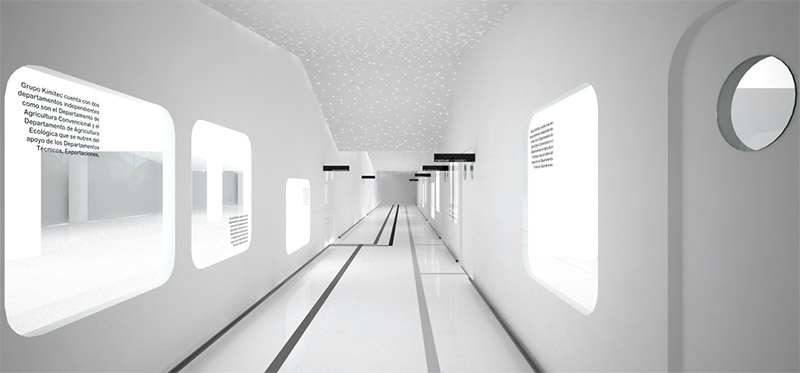 Además el centro dispondrá de invernaderos en los que se realizarán los ensayos, sobre todo aquellos relacionados con la agricultura de los países mediterráneos; y habrá también otra zona de ensayos para cultivos al aire libre.
Además el centro dispondrá de invernaderos en los que se realizarán los ensayos, sobre todo aquellos relacionados con la agricultura de los países mediterráneos; y habrá también otra zona de ensayos para cultivos al aire libre.
Fábrica de producción
Se trata de la segunda fase. Constituida por una gran fábrica de producción de biopesticidas y biofertilizantes. Productos botánicos, microbiológicos y probióticos (estos últimos dirigidos al agro, la ganadería y los humanos).
Esta segunda fase será la de la gestación de la Fundación Andrés Iniesta. Una iniciativa que entroncará con los valores que Kimitec Group quiere transmitir a las próximas generaciones. Se crearán infraestructuras deportivas con el objetivo de formar e integrar a las diferentes culturas que conviven en Almería, a través del deporte.
“Detrás de este gran proyecto en el que centralizaremos nuestras instalaciones, centro de I+D y fábrica, impulsaremos no solo un cambio en la economía local, sino que también fomentaremos otros valores de carácter social entre los más jóvenes”, resume el CEO de la compañía andaluza.
Kimitec Group will build the biggest biopesticides and biofertilizer center in Spain
There is no other project this big in this sector. It counts with 38 million euros investment, with which Kimitec Group converts the «Poniente Almeria» into the Silicon Valley of agricultural research in biopesticides, biofertilizers, and probiotics. In just a few days the first earthworks can be seen on the north side of Mediterranean highway, passing by Vícar.
«We are very excited about this biotechnology center,» says Félix García, CEO of Kimitec Group, «because with this project we want to convert Almería into a science reference, leaving the best legacy for the future generations.»
A scientific legacy sustained on three main pillars. The Kimitec Group biotech center shall be addressed to agriculture (biopesticides and biofertilizers); livestock through probiotics development, to eliminate, for example, the antibiotics use; and to humans, by creating and designing functional foods.
Two stages: R&D center and production factory
The project consists of two phases. The first starts this month (March), and will be complete before this year ends, with the opening of the largest R&D center for agriculture, livestock and humans in Spain. The Ministry of Industry, IDEA Agency (Junta of Andalusia), and the Vícar Town Hall also support it.
The second phase covers the largest amount of the planned investment and will start in early 2018, concluding a year later. The building is unique, and counts with three architecture studios currently working on it, with seven architects, including José Salinas.
The R&D center
The research area is a priority for Kimitec. That is why the R&D center is the first part of the project to see the light. The center’s main areas are microbiology and botany, with their respective laboratories. There will also be rooms (pilot and semi-industrial scale) to support both areas. For example, semi-industrial areas of fermentation and different kinds of botanical extraction. Subareas for many distinct tasks, such as strains, fungi, and bacteria cultivation to repopulate soils; or plant and pests breeding for trials. These are just some of many R&D developments and activities that will be carried out in the future center.
The phytotron also plays a relevant role, as it is a camera that can locally emulate the conditions at the destination. Thus, implementing certain light, humidity and temperature parameters, Kimitec researchers can work with bacteria and fungi, as if they were in their natural habitat. “In Almeria, we will be able to reproduce Colombia or Finland conditions in a camera if there is the case. Actually, we can reproduce the conditions of any place of the world that our research team requires”, affirms Félix García.
The CEO highlights the installation size: «There are over three thousand meters dedicated to researching biopesticides and probiotics. With them, we want to compete with chemical pesticides multinational companies, providing to farmers effective and sustainable solutions without residues, making us more competitive.«
Also, the center will count with greenhouses to perform trials, especially those related to Mediterranean countries agriculture. There will also be another trial area for outdoor crops.
Production factory
This is the second phase. It consists of a large biopesticides and biofertilizers production factory. Botanical, microbial and probiotic products (the last ones directed to agriculture, livestock, and humans).
Andrés Iniesta Foundation will manage this second phase. It is an initiative that fulfills the values that Kimitec Group wants to convey to future generations. Sports facilities will be created, aiming to train and integrate different cultures that live in Almeria through sport.
«Behind this great project that centralizes our facilities, R&D center, and factory, the idea does not only promote a local economy change but also support other social values among young people,» summarizes the CEO of the Andalusian Company.







